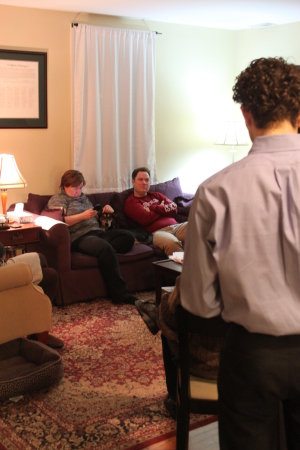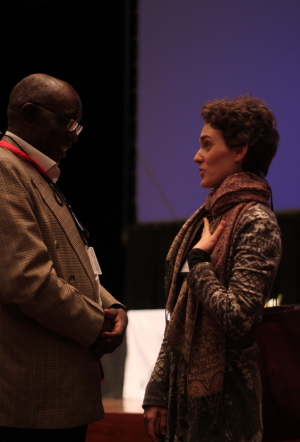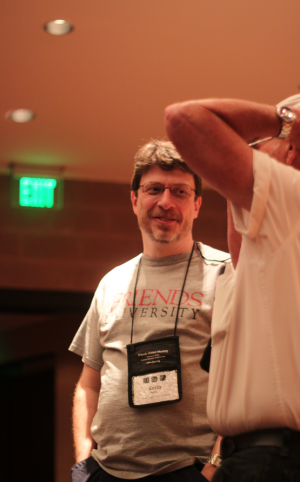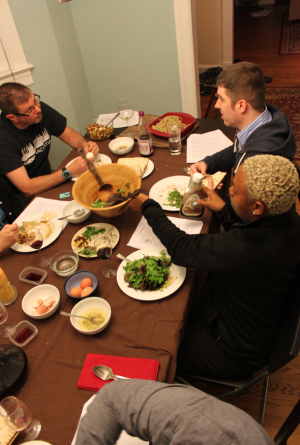 Have you ever experienced a setback so devastating that all you wanted to do was hide – from family, from friends, from the communities you’re a part of? One of the reasons we become part of church community is the promise of a space where we can be fully ourselves and find support when we need it. That’s the theory, anyway.
Have you ever experienced a setback so devastating that all you wanted to do was hide – from family, from friends, from the communities you’re a part of? One of the reasons we become part of church community is the promise of a space where we can be fully ourselves and find support when we need it. That’s the theory, anyway.
As most of us know, however, the reality is a little bit stickier. Ironically, it is precisely in our moments of greatest challenge – those times when we need the support of our friends the most – that we withdraw and isolate ourselves. It could be you’ve relapsed into addictive behavior. Maybe you’ve hurt someone close to you with your words or actions. Or perhaps it’s something that’s hard to explain, like a creeping depression that darkens every waking moment.
Running Away
For my friend Katie, the crisis was divorce. She describes in a recent blog post how she chose to run away from her church community during a time when her marriage had fallen apart. When things came to that point, she wasn’t sure that she could trust her community with her sense of devastating loss. She went looking for a church where no one would know what she had been through. She sought anonymity in a different crowd.
Have you ever experienced a situation like this? Why is it that we so often retreat from those around us at precisely the moment that we need loving care the most?
The Church that Judges Together…
I suspect a lot of it has to do with the fear of being judged. In every community, and Christian communities are no exception, there are certain types of crisis that are more acceptable than others. If my house burns down or I get in a car accident, for example, that’s probably something I’m going to feel comfortable taking to my community. I know they won’t look down on me for something that is outside of my control.
 There are other types of trauma that I’ll be less comfortable sharing with others. Divorce, bankruptcy, addiction, criminal behavior, or any other way in which my life may be spinning out of control. It takes real courage to bring these challenges to my community, because there is always the risk that, in addition to all the heartache and shame I already feel, my friends will reject me, too. It can seem safer to avoid that risk altogether, to find a new community where no one knows my past. Or to drop out of community altogether.
There are other types of trauma that I’ll be less comfortable sharing with others. Divorce, bankruptcy, addiction, criminal behavior, or any other way in which my life may be spinning out of control. It takes real courage to bring these challenges to my community, because there is always the risk that, in addition to all the heartache and shame I already feel, my friends will reject me, too. It can seem safer to avoid that risk altogether, to find a new community where no one knows my past. Or to drop out of community altogether.
Cracking the Shell of Despair
It can be hard to see it in the moment, but often these times of deep crisis are opportunities for the kind of growth that just isn’t possible until our lives are shattered. Just like a seed can only grow by breaking and sprouting, you and I can only experience transformation when our old lives are visibly exploded.
The same is true for our communities. We cannot grow as a people until we embrace our shared brokenness. If there is not room in the church for the expression of darkness and doubt, where could there be? Aren’t we followers, after all, of a man who cried out on the cross, My God, my God, why have you forsaken me? We are brothers and sisters of the crucified savior, the wounded healer, the broken messiah whose new life comes to us through the experience of shame, loss, and defeat.
Judgment-Free Community
What will it take for us to become communities where the hurting, the ashamed, the doubting, the confused – that is to say, each one of us – is welcomed into a space of transformation without human judgment getting in the way?
 Trust God. In Jesus, God has experienced every pain, temptation, and loss that we have – and then some. We’re not alone, we’re not abandoned, we’re not forgotten. The Spirit is especially present with us when we are at the bottom of the pit. We are lifted up precisely in that moment when we cry out in our pain: Abba, Father!
Trust God. In Jesus, God has experienced every pain, temptation, and loss that we have – and then some. We’re not alone, we’re not abandoned, we’re not forgotten. The Spirit is especially present with us when we are at the bottom of the pit. We are lifted up precisely in that moment when we cry out in our pain: Abba, Father!
- Trust yourself. When you trust God, you have no choice but to trust yourself, too. God created your whole life as a vessel of the Spirit’s life and power. Know that Christ dwells within you, and that his healing love can overcome any challenge, no matter how painful or shameful it may seem at the moment. Stand still and wait for Christ’s power, and he will shine in your heart and show you a path forward, straight and clear. It won’t be an easy, quick fix; but it will be a path that heals and transforms.
- Trust the community. As a fellowship in Christ, we’re still human. We’re going to make mistakes. Really bad ones, sometimes. Yet, it is through fallible little bands such as ours that God has chosen to carry out the restoration of the world. I still can’t fathom how the Spirit could use people like me to heal the world, but we have learned that God chose that which is low and despised in the world, even the things that are not, to bring to nothing the things that are. God is working in us and through us, even when it seems highly unlikely.
Be the Change
Do you want to be part of a community that is loving, open, and humble enough to welcome those who are facing the deepest struggles of their lives? These kinds of fellowships do exist, but they don’t happen by accident. If we want to be a people who can welcome the brokenhearted, we must first face our own brokenness.
 We all know it’s a bad idea to wait until a hurricane hits to begin weather-proofing your house. In the same way, it is important that we develop the habit of sharing our lives with one another – both joy and grief – even when it would be more comfortable to keep things to ourselves. Authentic community is only possible when we are up-front with our whole selves, even those parts that make us uncomfortable.
We all know it’s a bad idea to wait until a hurricane hits to begin weather-proofing your house. In the same way, it is important that we develop the habit of sharing our lives with one another – both joy and grief – even when it would be more comfortable to keep things to ourselves. Authentic community is only possible when we are up-front with our whole selves, even those parts that make us uncomfortable.
Everyone can feel the difference between an open and honest community and one where we wear masks. Many groups feel stuffy and closed, like the air hasn’t circulated in a long time. It’s easy to suffocate there. Other communities have opened up the windows of their lives, letting the breeze flow through.
When times are good, it can often make sense to participate in stuffy communities. There are advantages to closed windows, after all. Climate control provides a certain stability. But we all know where we want to be when we’re gasping for air.
If your life began to fall apart, would your community be a place where you would feel safe staying and working through it? What would it look like to encourage the free expression of struggle, doubt, and crisis in your community? Are you ready to open up your life, being transparent in your own struggles?
Please share in the comments below:
- What has been your experience of facing crisis in community?
- Do you feel like your fellowship has a culture of embracing struggle, or burying it?
- What steps could you take to encourage raw authenticity and spiritual/emotional hospitality in your life?